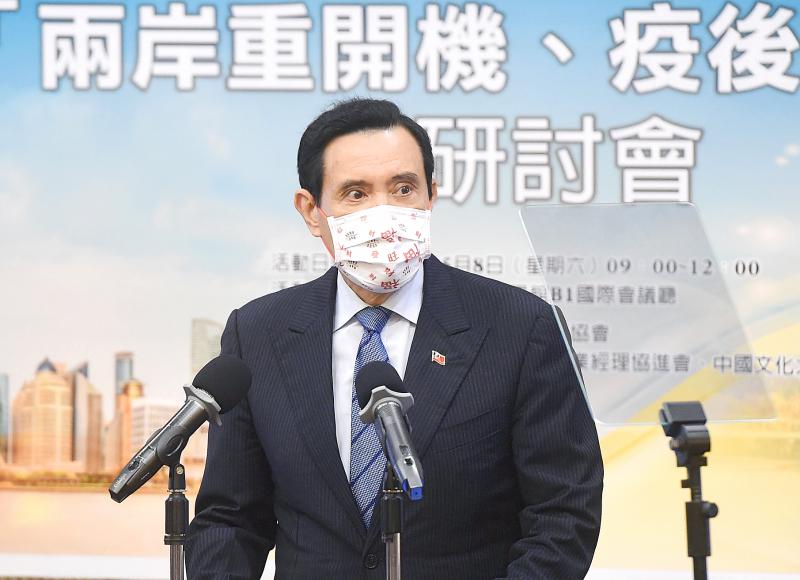Former president Ma Ying-jeou (馬英九) yesterday criticized the Democratic Progressive Party (DPP) for the state of Taiwan-China relations, and urged it to recognize the so-called “1992 consensus.”
Speaking at a Taipei symposium on Taiwan-China relations, Ma said that President Tsai Ing-wen’s (蔡英文) administration had failed to come up with an alternative to the “consensus” and had fostered ill sentiment toward China.
The “1992 consensus” — a term former Mainland Affairs Council chairman Su Chi (蘇起) in 2006 admitted making up in 2000 — refers to a tacit understanding between the Chinese Nationalist Party (KMT) and the Chinese government that both sides acknowledge there is “one China,” with each side having its own interpretation of what “China” means.

Photo: Chien Jung-fong, Taipei Times
US and European think tanks have warned of a possible military conflict in the Taiwan Strait within the next six years, and the international community has called for Taiwan and the US to engage in dialogue with China, he said, adding that this should be accomplished by recognition of the “consensus.”
“The two sides of the Strait need to restore or rebuild a common political foundation,” he said.
Recognition of the “consensus” would be necessary for Tsai to realize her campaign promise of maintaining the “status quo” in cross-strait relations, he added.
“Tsai and the DPP have tarnished the 1992 consensus by equating it with the ‘one country, two systems’ framework,” he said, adding that China’s Taiwan Affairs Office was “not denying that the consensus meant ‘one China, with different interpretations.’”
“The Republic of China Constitution does not allow for two Chinas, or one China and one Taiwan. If Tsai would clearly affirm this there could be room for cross-strait dialogue,” he said.
Ma called on both sides of the Strait to strive for better relations and demonstrate good will.
Taipei and Beijing could “build a bridge of peace” if both sides could return to the situation of “not recognizing each other’s sovereignty, but also not refuting each other’s right to govern,” he said, adding that this was necessary to prevent war.
The Mainland Affairs Council said that Beijing had already defined the “consensus” as meaning the “one China” principle, with no room for any other interpretation.
In a speech on Jan. 2, 2019, Chinese President Xi Jinping (習近平) said that unification with Taiwan under the “one country, two systems” framework was inevitable, and although Beijing would exhaust all options for peaceful unification, it would not rule out the use of military force.
Xi’s speech made it clear that Beijing’s interpretation of the “consensus” meant that Taiwan would be annexed under the “one country, two systems” model, the council said.
“The outcome of last year’s presidential election clearly demonstrated that Taiwanese resolutely oppose the application of a ‘one country, two systems’ formula to Taiwan,” it said.
“History has already turned the page on the ‘1992 consensus.’ There is no need to discuss it any longer,” it added.
Additional reporting by Chung Li-hua

Taiwan is stepping up plans to create self-sufficient supply chains for combat drones and increase foreign orders from the US to counter China’s numerical superiority, a defense official said on Saturday. Commenting on condition of anonymity, the official said the nation’s armed forces are in agreement with US Admiral Samuel Paparo’s assessment that Taiwan’s military must be prepared to turn the nation’s waters into a “hellscape” for the Chinese People’s Liberation Army (PLA). Paparo, the commander of the US Indo-Pacific Command, reiterated the concept during a Congressional hearing in Washington on Wednesday. He first coined the term in a security conference last

Prosecutors today declined to say who was questioned regarding alleged forgery on petitions to recall Democratic Progressive Party (DPP) legislators, after Chinese-language media earlier reported that members of the Chinese Nationalist Party (KMT) Youth League were brought in for questioning. The Ministry of Justice Investigation Bureau confirmed that two people had been questioned, but did not disclose any further information about the ongoing investigation. KMT Youth League members Lee Hsiao-liang (李孝亮) and Liu Szu-yin (劉思吟) — who are leading the effort to recall DPP caucus chief executive Rosalia Wu (吳思瑤) and Legislator Wu Pei-yi (吳沛憶) — both posted on Facebook saying: “I

The Ministry of Economic Affairs has fined Taobao NT$1.2 million (US$36,912) for advertisements that exceed its approved business scope, requiring the Chinese e-commerce platform to make corrections in the first half of this year or its license may be revoked. Lawmakers have called for stricter enforcement of Chinese e-commerce platforms and measures to prevent China from laundering its goods through Taiwan in response to US President Donald Trump’s heavy tariffs on China. The Legislative Yuan’s Finance Committee met today to discuss policies to prevent China from dumping goods in Taiwan, inviting government agencies to report. Democratic Progressive Party Legislator Kuo Kuo-wen (郭國文) said

The Ministry of Economic Affairs has fined Taobao NT$1.2 million (US$36,900) for advertisements that exceeded its approved business scope and ordered the Chinese e-commerce platform to make corrections in the first half of this year or its license would be revoked. Lawmakers have called for stricter supervision of Chinese e-commerce platforms and more stringent measures to prevent China from laundering its goods through Taiwan as US President Donald Trump’s administration cracks down on origin laundering. The legislature’s Finance Committee yesterday met to discuss policies to prevent China from dumping goods in Taiwan, inviting government agencies to report on the matter. Democratic Progressive Party